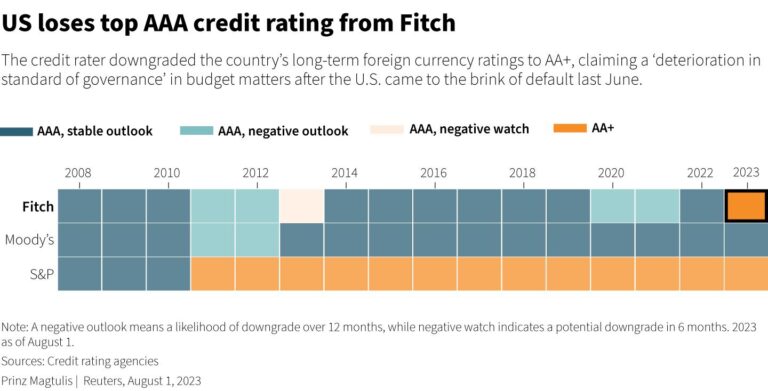Fitch Downgrades Crisis-Strained France Amid Economic Concerns
In a significant move reflecting mounting economic pressures, Fitch Ratings has downgraded France’s credit rating, raising alarms about the nation’s financial stability. The decision comes as the country grapples with a myriad of challenges, including soaring inflation, a sluggish recovery post-pandemic, and rising social unrest. As France navigates these turbulent waters, the downgrade underscores growing concerns among analysts and investors about the government’s ability to implement effective economic reforms and restore fiscal confidence. This development not only impacts France’s standing in global financial markets but also raises questions about the broader implications for the European economy.
Fitch’s Downgrade of France Signals Economic Turbulence Ahead
The recent decision by Fitch Ratings to downgrade FranceŌĆÖs credit rating highlights a growing concern over the nation’s economic stability. This shift is seen as a direct reflection of the ongoing challenges facing the French government, including high public debt levels and sluggish growth rates. Investors are particularly wary, as the downgrade may signify potential difficulties in the countryŌĆÖs ability to finance its obligations, leading to increased borrowing costs. The implications are far-reaching, affecting not only France but also the broader Eurozone economy, which has been navigating its own set of challenges.
Several factors have contributed to this unsettling downgrade:
- High Debt Burden: France’s public debt continues to rise, creating concerns about fiscal sustainability.
- Weak Economic Growth: Recent economic indicators have shown a slowdown, casting doubt on future recovery prospects.
- Political Uncertainty: Instability within the French government has raised alarm among investors regarding policy continuity.
| Indicator | Current Status | Outlook |
|---|---|---|
| Public Debt (% of GDP) | 112% | Rising |
| GDP Growth Rate | 0.5% | Sluggish |
| Unemployment Rate | 7.1% | Stable |
Implications for Investors and Financial Markets
The recent downgrade of France by Fitch Ratings has sent ripples through global financial markets, raising concerns among investors about the stability of one of Europe’s major economies. This decision could lead to a reassessment of risk profiles across various asset classes, particularly in European sovereign bonds. Investors may experience heightened volatility as they adjust their portfolios in response to the perceived decline in creditworthiness. Key factors to watch include:
- Impact on Yield Spreads: A downgrade typically results in a widening of yield spreads, signaling increased risk.
- Investor Sentiment: Confidence in French equities might plummet, leading to possible sell-offs.
- Currency Fluctuations: The euro may weaken against other currencies, impacting international investors.
Moreover, the downgrade can shift capital away from France, affecting foreign direct investment and overall economic growth. As market participants recalibrate their expectations for fiscal stability, sectors such as banking and real estate could experience pronounced effects. The following table summarizes potential impacts on various market segments:
| Market Segment | Potential Impact |
|---|---|
| Sovereign Bonds | Increased yields and reduced demand |
| Equities | Potential sell-off and market corrections |
| Foreign Investment | Decline in new projects and capital influx |
Government Response: Strategies to Restore Confidence
In response to the recent downgrade by Fitch, the French government has articulated a set of comprehensive strategies aimed at restoring investor confidence and stabilizing the economy. Key initiatives include:
- Fiscal Responsibility: The government is committed to reducing the public debt by implementing tighter budgetary controls and cutting unnecessary expenditures.
- Economic Growth Incentives: A renewed focus on policies that stimulate small and medium enterprises, fostering innovation and job creation.
- Public Investment Plans: Increased investment in infrastructure and green technology aimed at driving long-term sustainability and employment.
In addition to these measures, authorities are seeking to enhance transparency and communication with stakeholders to reassure the public and financial markets. The implementation of strict compliance regimes will be monitored closely, with regular updates shared through established channels. A proposed partnership with financial experts aims to design tailor-made solutions to address potential risks highlighted by the downgrade.
| Measure | Goal | Timeline |
|---|---|---|
| Budget Cuts | Reduce Deficit | 2024 |
| Investment Boost | Stimulate Growth | 2023-2025 |
| Compliance Framework | Enhance Transparency | Ongoing |
Future Outlook: Navigating the Path to Recovery
As Fitch Ratings’ recent downgrade of France reverberates through financial markets, the path to recovery appears daunting yet essential. Analysts highlight increased government spending, stabilizing employment, and strategic investments in green technology as pivotal components to stimulate economic recovery. Uncertainties remain, particularly regarding inflation and the potential for further downgrades. Stakeholders are urged to implement a coordinated policy response focused on fiscal discipline while engendering confidence among investors and citizens alike.
In navigating this turbulent landscape, France must prioritize the following strategies:
- Strengthening fiscal policies: Ensuring prudent budget management can help restore investor trust.
- Enhancing productivity: Investing in technology and innovation can drive economic growth.
- Fostering public-private partnerships: Collaborative efforts could accelerate infrastructure development.
| Key Indicators | Current Status | Outlook |
|---|---|---|
| GDP Growth | Low | Gradual Recovery Expected |
| Unemployment Rate | High | Potential Decline |
| Inflation Rate | Rising | Stabilization Efforts Needed |
In Conclusion
In conclusion, Fitch Ratings’ decision to downgrade France amidst ongoing economic pressures underscores the challenges facing the country’s fiscal stability and growth prospects. This development not only highlights the pressing need for structural reforms but also signals a broader concern among investors regarding France’s ability to navigate its current crises. As the government grapples with rising debt, inflation, and social unrest, the implications of this downgrade will undoubtedly shape policy discussions and economic strategies moving forward. Observers will be closely monitoring France’s response in the coming weeks, as it seeks to restore confidence and stability in a tumultuous economic landscape.




